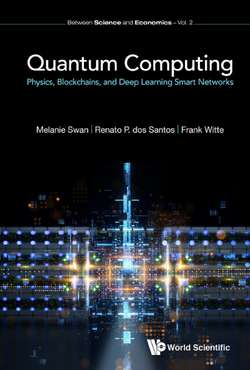Читать книгу Quantum Computing - Melanie Swan - Страница 6
На сайте Литреса книга снята с продажи.
ОглавлениеAbout the Authors
Melanie Swan is a research associate at the UCL Centre for Blockchain Technologies, a technology theorist in the Philosophy Department at Purdue University, and a Singularity University faculty member. She is the founder of several startups including the Institute for Blockchain Studies, DIYgenomics, GroupPurchase, and the MS Futures Group. Melanie’s educational background includes an MBA in Finance from the Wharton School of the University of Pennsylvania, a PhD in Philosophy from Purdue University, and a BA in French and Economics from Georgetown University. She is the author of the best-selling book Blockchain: Blueprint for a New Economy. Other notable work is on the topics of blockchain economics, human brain–cloud interface, BCI cloudminds, multigenic risk assessment, the Brain as a DAC (Decentralized Autonomous Corporation), neural payment channels, biocryptoeconomics, and block time (the native time domain of blockchains).
Renato P. dos Santos is a researcher on blockchain technologies and Graduate Professor at the Lutheran University of Brazil. He is a member of the British Blockchain Association, holds a DSc (Physics) degree and did post-doc works in artificial intelligence, and specializations in data science and block-chain technologies. He is also the author of more than 100 scientific papers about philosophy of cryptocurrencies, data science in STEM education, second life in STEM education, Web 2.0 technologies, ethnoscience, physics teaching, artificial intelligence and computer algebra in physics, and quantum field theory in prestigious scientific periodicals and events around the world. He is a reviewer and editor of prestigious scientific periodicals and events around the world and developed systems for second life, forex market, qualitative physics, and computer algebra.
Frank Witte completed an MSc in Theoretical Astrophysics (1992) at Utrecht University in the Netherlands and received his PhD in Theoretical Physics (1995) from the University of Heidelberg. As an assistant and associate professor he taught theoretical physics at Utrecht University and University College Utrecht (1997–2010) and published on diverse topics such a phase-transitions in non-equilibrium field theories, bound-states of fermions under gravitational interactions and the foundations of quantum game theory. As his research interests shifted towards the application of physics-inspired methods and concepts in economics he accepted a position in the Department of Economics of University College London where he is working today. He teaches economics of science, with a forthcoming textbook to be published by World Scientific, and environmental economics as well as computational methods for economists. Frank has spent extended academic visits, including teaching and research, at St. John’s College, Cambridge (UK), the Quantum Optics & Laser Science group at Imperial College London and as International Fellow of Grinnell College (US).
